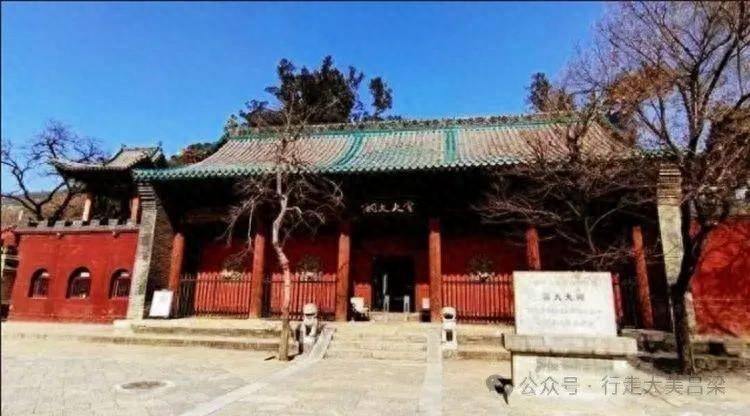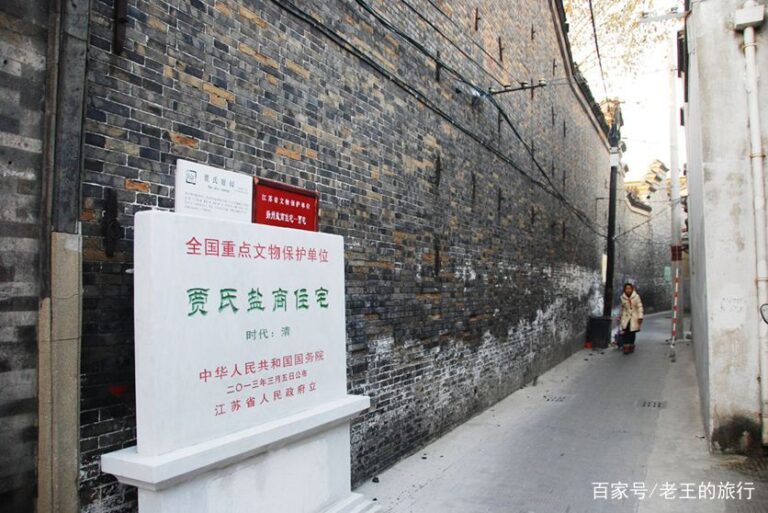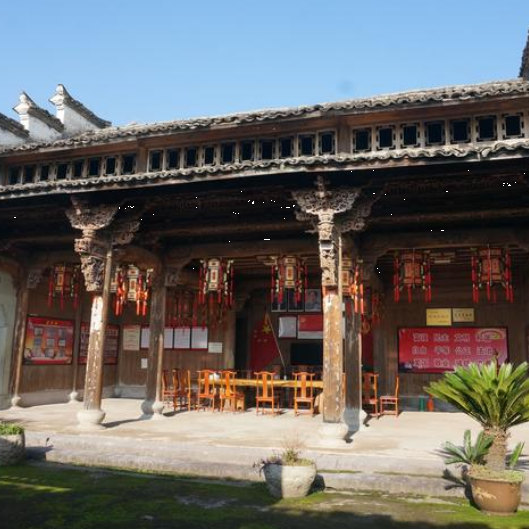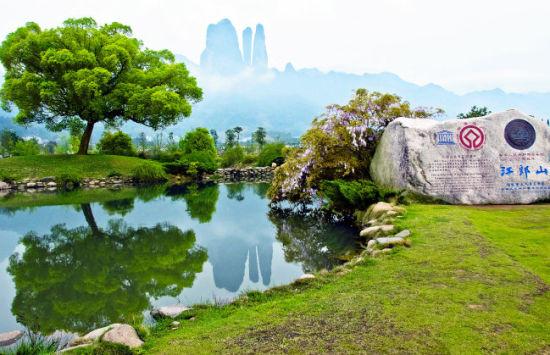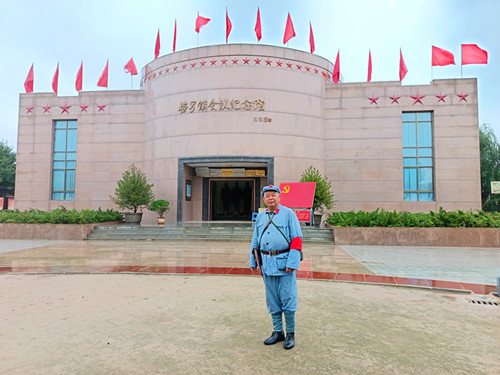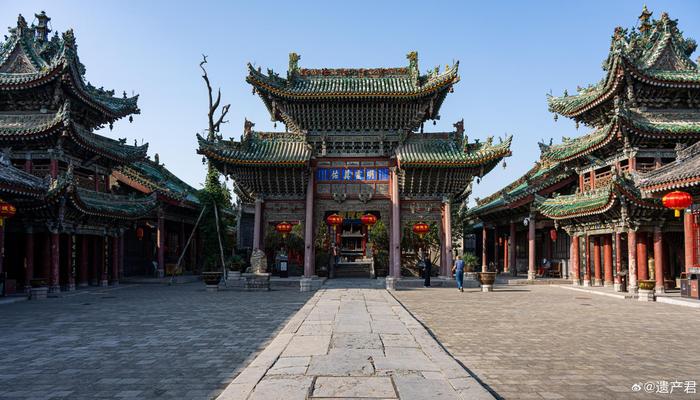A Journey Through Time: Exploring the Rich Heritage of Anyang Hanwangmiaoyuzhoujintang
An Essential Guide to Visiting Anyang Hanwangmiaoyuzhoujintang
In This Guide
- An Essential Guide to Visiting Anyang Hanwangmiaoyuzhoujintang
- The Rich History of Anyang Hanwangmiaoyuzhoujintang
- Main Highlights: What to See at Anyang Hanwangmiaoyuzhoujintang
- Planning Your Visit: A Practical Guide
- Tickets, Hours, and Booking
- How to Get There
- Local Cuisine and Accommodation
- Frequently Asked Questions
- Final Thoughts on Your Trip
Nestled in the heart of Anyang, Henan province, the Anyang Hanwangmiaoyuzhoujintang (韩王庙与昼锦堂) stands as a testament to the rich tapestry of Chinese history and culture. This historical site, commonly referred to as the Han Wang Temple and the Dayuan Hall, is not only a memorial for the revered Song Dynasty statesman Han Qi but also a vibrant reflection of the architectural and literary achievements of its time.
Dating back to the Northern Song Dynasty, the temple complex was originally constructed in 1068 to honor Han Qi, a prominent chancellor known for his integrity and governance. The intricately designed structures within the site, particularly the Dayuan Hall, showcase traditional Chinese architecture with their ornate green-glazed roofs and elegant wooden beams. Visitors are drawn to the inscriptions, notably the “Three Wonders Stele,” crafted by eminent scholars such as Ouyang Xiu, which further accentuates the cultural significance of this site.
As you wander through the tranquil gardens and halls, you will find yourself immersed in the serene atmosphere that has inspired countless poets and scholars over the centuries. The site has been a hub for literary gatherings, making it one of the four major gardens of the Northern Song era and a cherished sanctuary for intellectual discourse.
Today, the Han Wang Temple and Dayuan Hall serve as a vital cultural landmark, inviting tourists and history enthusiasts alike to explore the legacies of the past while appreciating the beauty of traditional Chinese design. Whether you are a history buff eager to uncover the stories of ancient China or simply looking for a peaceful escape amidst rich greenery, this historic site promises an unforgettable experience.
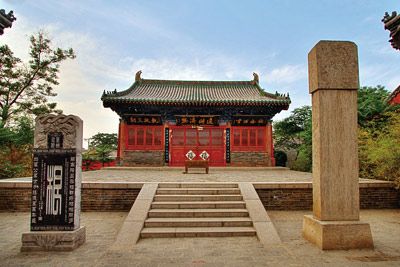
Anyang Hanwangmiaoyuzhoujintang.
The Rich History of Anyang Hanwangmiaoyuzhoujintang
The Anyang Hanwangmiaoyuzhoujintang, commonly known as the Hanwang Temple and the Zhoujin Hall, is a significant historical site located in Anyang, Henan Province, China. This site is deeply intertwined with the legacy of Han Qi, a prominent statesman of the Northern Song Dynasty, whose contributions to Chinese governance and culture are commemorated through this monument.
The origins of the site can be traced back to the Northern Song Dynasty, specifically during the reign of Emperor Renzong (1022-1063). The Zhoujin Hall was initially constructed on the northern side of East Street in the old city of Anyang. Han Qi, who served as the governor of Xiangzhou, commissioned the construction of this hall as part of a larger renovation of the local government structures. The name “Zhoujin” derives from a phrase in the “Book of Han,” which reflects the idea that wealth and status should ultimately return to one’s homeland, contrasting the notion of “riches worn like brocade at night” without public acknowledgment.
This elegant garden, characterized by its red walls and green tiles, became a gathering place for scholars and poets during the Northern Song era, earning a reputation as one of the four great gardens of the period. Among its esteemed visitors was the renowned writer Ouyang Xiu, who penned a memorial for the hall, praising Han Qi’s wisdom and integrity in governance.
Despite its initial grandeur, Zhoujin Hall suffered from neglect after the Southern Song Dynasty, leading to its gradual deterioration. In 1498, during the Ming Dynasty, local officials undertook efforts to restore the hall, constructing a “New Zhoujin Hall” adjacent to the Hanwang Temple, thus integrating the two sites. Further renovations occurred during the Qing Dynasty under Governor Li Wei, who expanded the hall and renamed it Zhoujin Academy.
Today, the site comprises several key architectural features, including the main hall, the ceremonial gates, and a stone tablet pavilion housing the “Zhoujin Hall Inscription,” which is celebrated for its artistic calligraphy and literary significance. This inscription, created by Ouyang Xiu and further embellished by the calligrapher Cai Xiang, highlights Han Qi’s enduring legacy as a guardian of the state and a model of virtuous leadership.
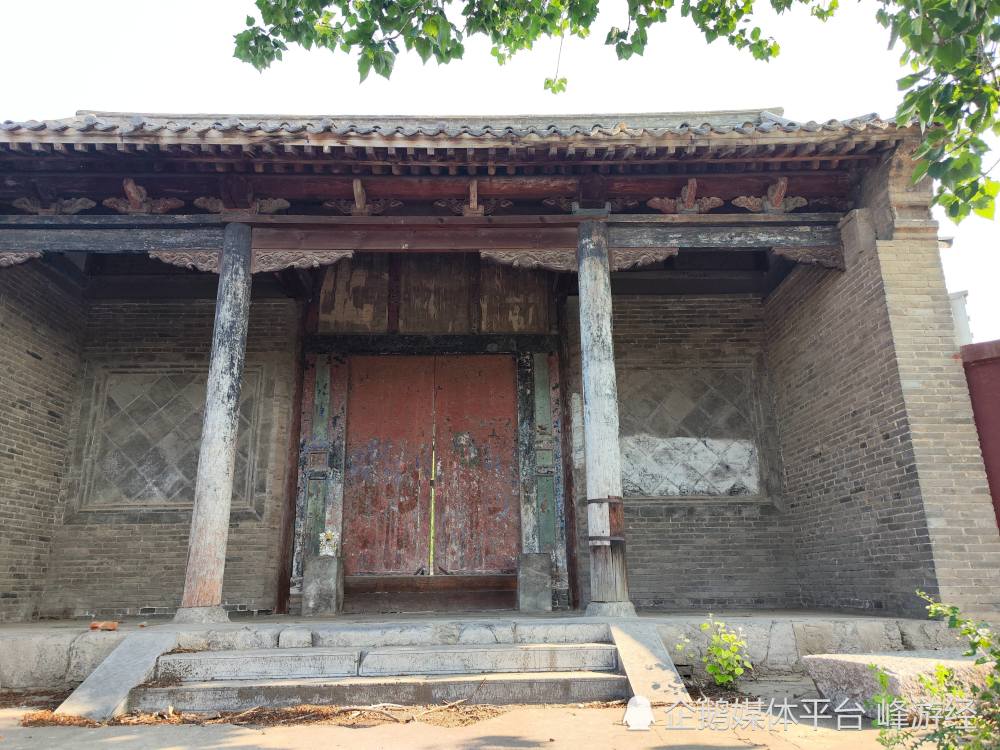
Anyang Hanwangmiaoyuzhoujintang.
Visitors to the Anyang Hanwangmiaoyuzhoujintang can appreciate both its historical importance and its role as a cultural hub, where the echoes of ancient scholarly pursuits still resonate among the remnants of its once-lush gardens and stately halls. The site stands not only as a tribute to Han Qi but also as a testament to the rich tapestry of Chinese history and the enduring values of governance and scholarship.
Main Highlights: What to See at Anyang Hanwangmiaoyuzhoujintang
Discover the rich history and architectural beauty of Anyang Hanwangmiaoyuzhoujintang, a site steeped in the legacy of Song Dynasty statesman Han Qi. This cultural landmark, known as Hanwang Temple and Zhujintang, draws visitors with its historical significance and serene gardens.
One of the most notable features of the site is Zhujintang itself, originally constructed during the Northern Song Dynasty in the early 11th century. Han Qi, the esteemed chancellor, commissioned its construction as a symbol of his dedication to his homeland. The name “Zhujintang” derives from a poignant line in the “Book of Han,” reflecting the sentiment that wealth and honor should not be forgotten in one’s birthplace.
Visitors will be captivated by the exquisite architecture of Zhujintang, with its elegant red walls and green tiles nestled among ancient cypress trees. The hall showcases a harmonious blend of nature and man-made beauty, making it a perfect spot for reflection and inspiration.
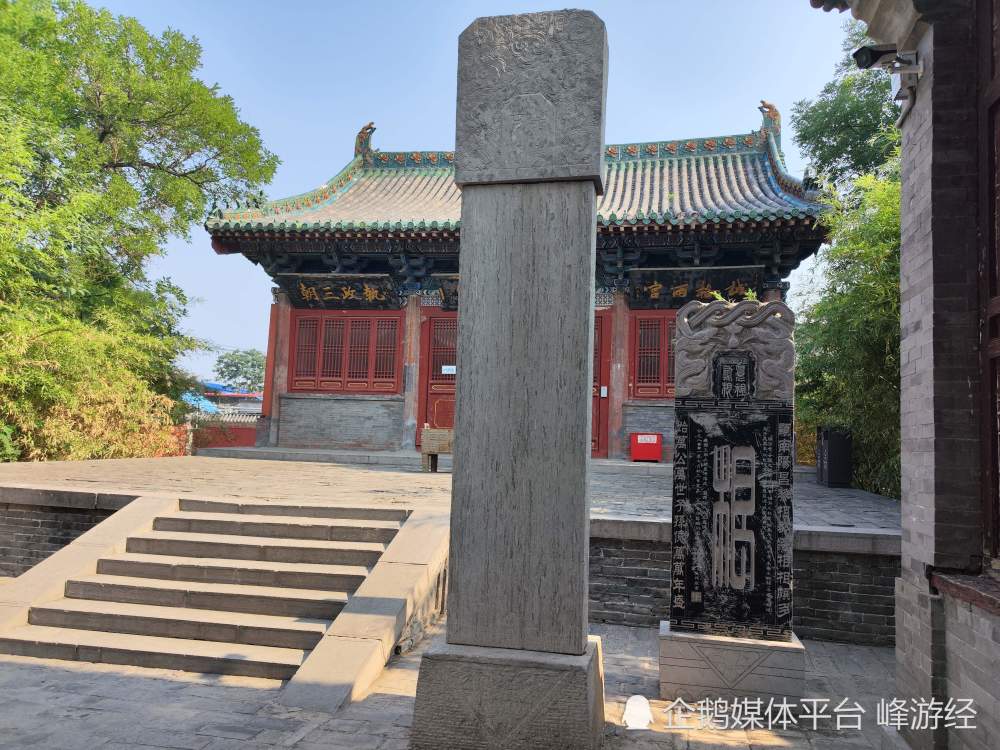
Anyang Hanwangmiaoyuzhoujintang.
The cultural reverence of the site is further amplified by the presence of the “Three Exceptional Stele” (San Jue Bei), which is a significant artifact featuring writings by the renowned poet Ouyang Xiu. This stele commemorates Han Qi’s accomplishments and remains a testament to the literary prowess of the era.
The surrounding gardens, once a vibrant gathering place for scholars and poets, echo with the whispers of history. Here, visitors can imagine the debates and discussions that once filled the air, as literary figures sought wisdom and knowledge amidst the tranquil landscape.
In addition to its historical and literary significance, the site offers a peaceful escape from the bustle of modern life. Whether you’re wandering through the gardens or admiring the intricate architectural details, Anyang Hanwangmiaoyuzhoujintang promises an enriching experience that connects you to China’s profound cultural heritage.
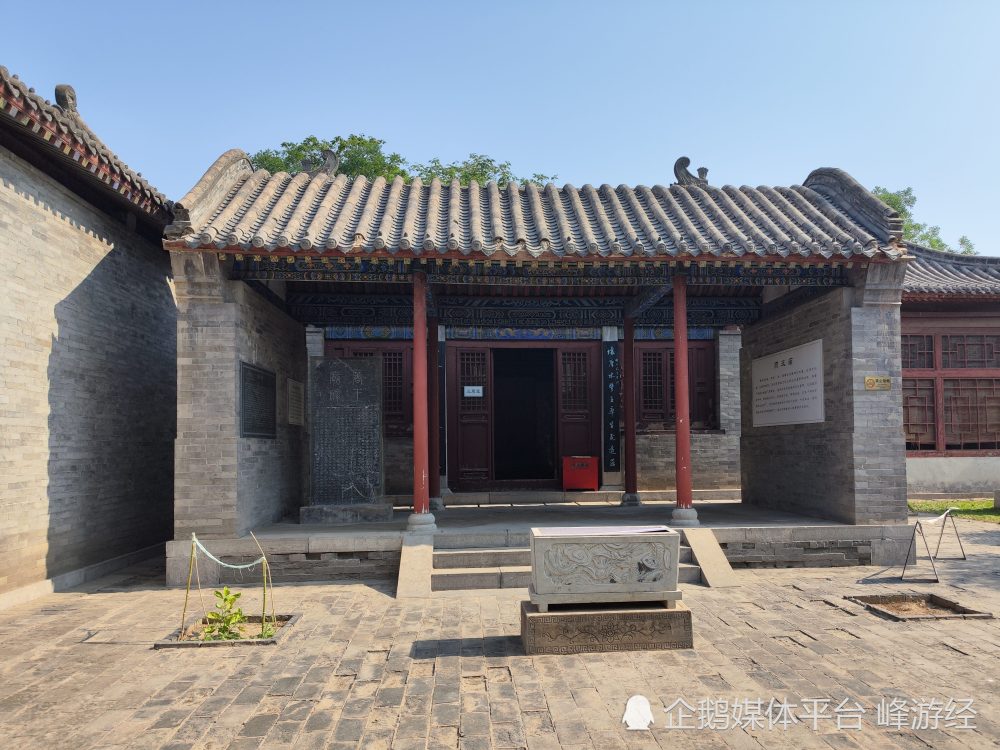
Anyang Hanwangmiaoyuzhoujintang.
When planning your visit, be sure to check the local schedule for events or exhibitions that may enhance your experience, and take a moment to enjoy the nearby attractions, including the famous Wenfeng Tower and the bustling Cangxiang Street, which together provide a fuller picture of Anyang’s vibrant history.
Planning Your Visit: A Practical Guide
When planning a visit to Anyang Hanwangmiaoyuzhoujintang, also known as the Han Wang Temple and the Zhujin Hall, you’ll find a rich tapestry of history, architecture, and cultural significance waiting for you. Here’s what you need to know to make the most of your experience.
Location and Accessibility
The Han Wang Temple, located in the cultural heart of Anyang, Henan Province, can be easily accessed via public transport. Visitors can take bus routes 8 or 17 and disembark at the Dadongmen station, followed by a short walk to the site. For those driving, the temple is located at the northern end of Southeast Ying Street. However, parking can be limited, so it’s advisable to arrive early.
Opening Hours and Admission Fees
The temple is open year-round, with seasonal hours:
– Summer (April to October): 8:00 AM – 6:00 PM
– Winter (November to March): 8:00 AM – 5:00 PM
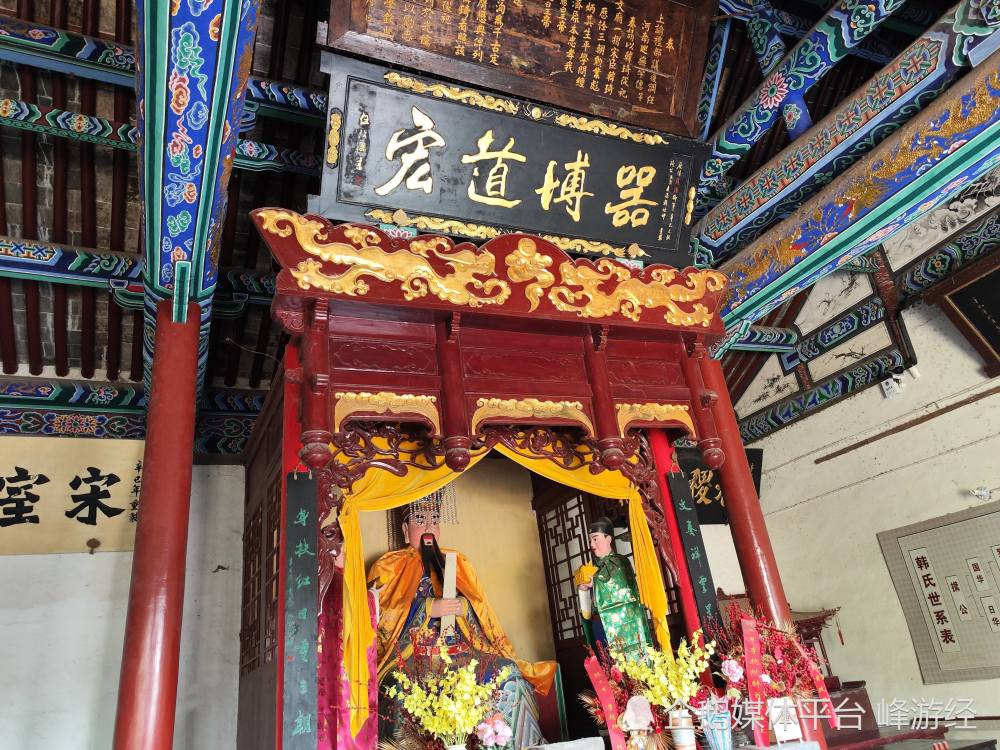
Anyang Hanwangmiaoyuzhoujintang.
Admission to the Han Wang Temple is reasonably priced at 20 RMB (approximately $3). This ticket grants you access to not only the temple but also the adjacent Zhujin Hall, where you can delve into the life of the revered statesman Han Qi.
Exploring the Site
The Han Wang Temple complex is notable for its historical significance and architectural beauty.
-
Han Wang Temple: Originally built to honor Han Qi, a prominent statesman of the Northern Song Dynasty, this temple showcases traditional Chinese architecture, including a stunning wooden beam structure from the Yuan Dynasty. As you explore the temple, take time to admire the intricate carvings and inscriptions, including the famous “Three Uniques Stele,” which features works from well-known scholars of the time.
-
Zhujin Hall: This hall, named in reference to a quote from the “Book of Han,” features elegant gardens and pavilions that once attracted poets and scholars. Although parts of the hall have been lost to time, its serene atmosphere and historical context make it a must-visit.
What to Bring
- Comfortable Shoes: The temple grounds are expansive, and you’ll want to walk around and take your time exploring.
- Camera: Capture the stunning architecture and serene gardens.
- Water: Staying hydrated is essential, especially in warmer months.
Nearby Attractions
After visiting the Han Wang Temple, consider exploring these nearby attractions:
– Yinxu (殷墟): A UNESCO World Heritage site known for its archaeological significance.
– Tian Ning Temple (天宁寺): Famous for its impressive pagoda and tranquil environment.
– Cangxiang Street (仓巷街): A historic street perfect for a leisurely stroll, offering local snacks and shops.
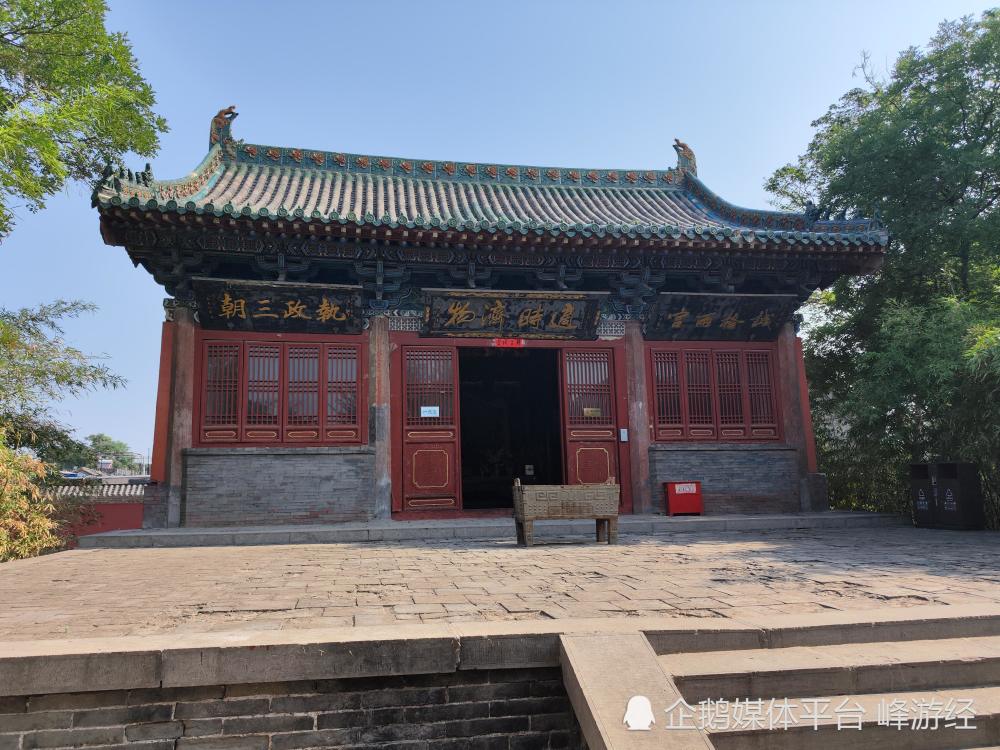
Anyang Hanwangmiaoyuzhoujintang.
Dining and Shopping
While there are no dining facilities within the temple complex, you can find local eateries nearby serving authentic Henan cuisine. Popular options include:
– Sheng De Li: Known for its traditional dishes.
– Tong Lai Shun: A great spot for a quick lunch.
For shopping, Cangxiang Street hosts several shops selling local handicrafts and souvenirs, allowing you to take a piece of Anyang home with you.
Tips for Your Visit
- Guided Tours: Consider joining a guided tour for deeper insights into the history and architecture of the temple.
- Best Time to Visit: Early mornings or weekdays tend to be less crowded, providing a more peaceful experience.
- Respectful Attire: As a religious site, it’s advisable to dress modestly.
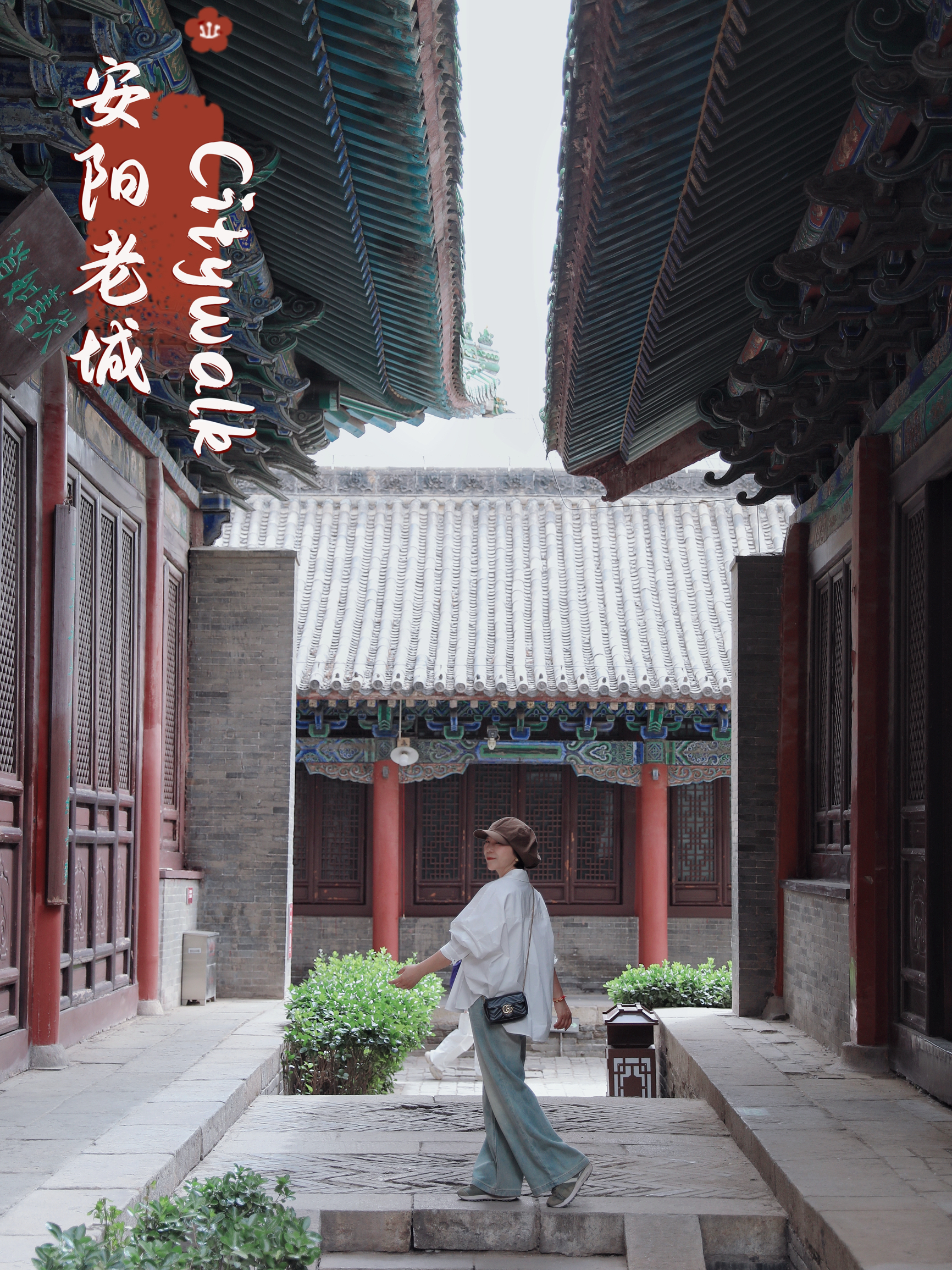
Anyang Hanwangmiaoyuzhoujintang.
By planning ahead and making the most of your visit to the Han Wang Temple and Zhujin Hall, you can immerse yourself in the rich cultural heritage of Anyang and appreciate the legacy of one of China’s great historical figures.
Tickets, Hours, and Booking
Visiting the Anyang Hanwang Miaoyuzhou Jintang (韩王庙与昼锦堂) offers a glimpse into the rich history and culture of the Northern Song Dynasty, and planning your visit is essential to make the most of your experience.
Ticket Pricing
The entrance fee for the site is 20 RMB (approximately $3 USD). This ticket grants you access to the main attractions, including the Han Wang Temple and the renowned Zhou Jin Hall (昼锦堂).
Opening Hours
The site operates under seasonal hours:
– Summer (April to October): 08:00 AM to 06:00 PM
– Winter (November to March): 08:00 AM to 05:00 PM
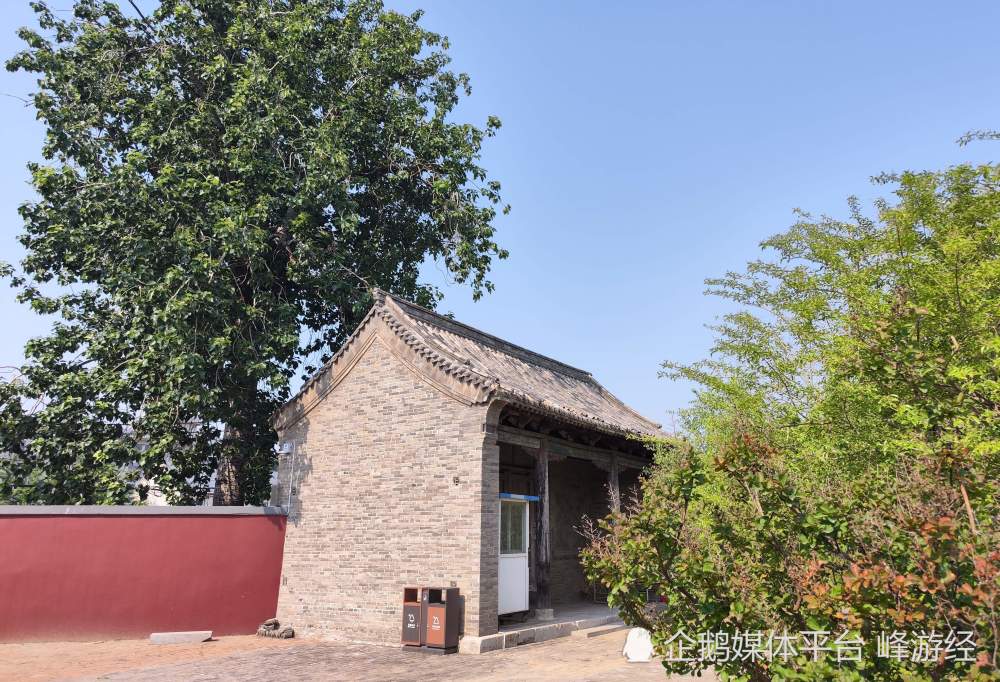
Anyang Hanwangmiaoyuzhoujintang.
Transportation Tips
To reach the venue, public transport is a convenient option. You can take bus routes 8 or 17 and disembark at the Da Dongmen stop, followed by a short walk to the entrance. If you prefer driving, there is a parking area nearby, though spaces can be limited, so plan accordingly.
Visitor Experience
While exploring, ensure you take your time to appreciate the historical architecture and the beautifully landscaped gardens. The Zhou Jin Hall, in particular, is famous for its literary significance, housing inscriptions crafted by notable scholars of the time.
Make sure to check local guides or apps for any special events or exhibitions that might be happening during your visit, as these can enhance your understanding of the site’s significance. Enjoy your journey into the historical heart of Anyang!
How to Get There
Getting to Anyang Hanwangmiaoyuzhoujintang (韩王庙与昼锦堂) is relatively straightforward, thanks to the convenient transportation options available in Anyang. Whether you’re arriving by bus, train, or private vehicle, there are multiple ways to reach this historic site.
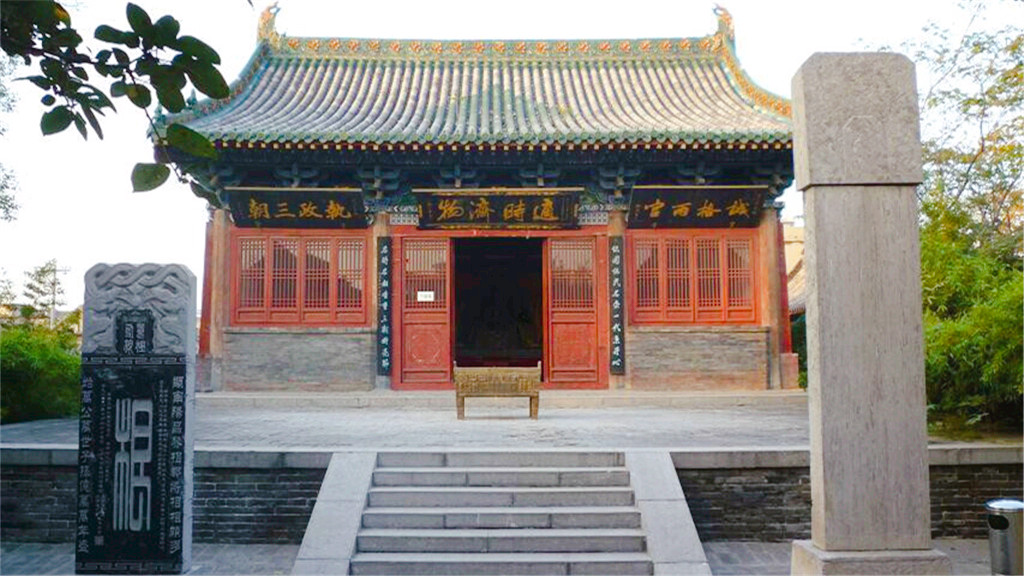
Anyang Hanwangmiaoyuzhoujintang.
By Public Transport
Bus Services:
Anyang’s public bus network is a reliable option for visitors. You can take either Bus Line 8 or Bus Line 17, both of which will take you to the Dadongmen Station (大东门站). From there, it’s a short walk to the entrance of Hanwang Temple (韩王庙), where you can easily access the Daydream Hall (昼锦堂).
Train Services:
If you’re traveling from larger cities like Beijing or Zhengzhou, taking a high-speed train to Anyang is a viable choice. The Anyang Railway Station is well-connected to major cities, and upon arrival, you can opt for a taxi or local bus to reach the temple complex.
By Car
Driving to Anyang provides flexibility in your travel plans. The site is well-signposted, and you can use GPS to navigate directly to Hanwang Temple located in the Wenfeng District along Cultural Road. Keep in mind that parking options may be limited, especially during peak tourist seasons, so it’s advisable to arrive early.
Accessibility
The site is designed to accommodate visitors with different needs. The main pathways are paved, and there are ramps available at certain areas to ensure accessibility for all.
Additional Tips
- Check the Local Bus Schedule: Buses may not run as frequently during off-peak hours or on weekends, so planning ahead can save time.
- Consider Taxi Services: If you prefer a direct route without the hassle of public transport, taxis are readily available and can be a comfortable choice.
- Plan Your Visit: The temple complex is open from 8:00 AM to 5:30 PM, so it’s wise to plan your arrival accordingly to make the most of your visit.
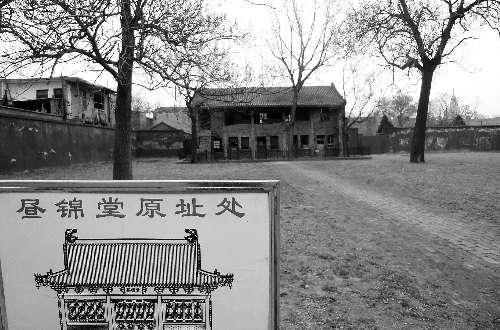
Anyang Hanwangmiaoyuzhoujintang.
With these transportation options, reaching Anyang Hanwangmiaoyuzhoujintang is a breeze, allowing you to fully immerse yourself in the historical and cultural richness of this significant site.
Local Cuisine and Accommodation
When visiting the Anyang Hanwangmiaoyuzhoujintang, you’ll find yourself immersed not only in the rich history of the site but also in the local culture, particularly through its food and accommodation options.
Dining Recommendations
- Shengde Li Restaurant (盛德利)
- Cuisine: Henan
- Description: Known for its authentic Henan dishes, Shengde Li offers a wide array of local specialties that reflect the region’s culinary heritage. The ambiance is casual, making it a perfect spot for families and travelers alike.
- Distance: Approximately 2.7 km from the site.
-
Average Price: ¥63 per person.
-
Tonglai Shun Restaurant (同来顺)
- Cuisine: Chinese (Various)
- Description: This restaurant is celebrated for its flavorful dishes and friendly service. It provides a diverse menu catering to different tastes, ensuring that every visitor can find something to enjoy.
- Distance: Around 2.0 km from the Hanwangmiaoyuzhoujintang.
-
Average Price: ¥45 per person.
-
Jiafeng Old Restaurant (家风老馆子)
- Cuisine: Henan
- Description: A perfect spot for those looking to experience traditional Henan flavors in a cozy setting. The restaurant prides itself on using fresh ingredients and time-honored recipes.
- Distance: About 2.4 km away.
- Average Price: ¥63 per person.
Accommodation Suggestions
- Anyang Ruili Wanda Hotel (安阳富力万达嘉华酒店)
- Description: This upscale hotel features modern amenities and is conveniently located near attractions, making it an ideal choice for travelers seeking comfort and convenience.
- Star Rating: 4 stars.
-
Average Price: ¥380 per night.
-
Zhefei Hotel (喆啡酒店)
- Description: A contemporary hotel that combines affordability with comfort, perfect for budget-conscious travelers. Its central location allows for easy access to local sites and eateries.
- Star Rating: 3 stars.
-
Average Price: ¥194 per night.
-
Jinjiang Inn (锦江之星)
- Description: Offering a clean and comfortable stay, Jinjiang Inn provides all the essential amenities for a pleasant visit. Its strategic location ensures you’re never far from the action.
- Star Rating: 2 stars.
- Average Price: ¥262 per night.
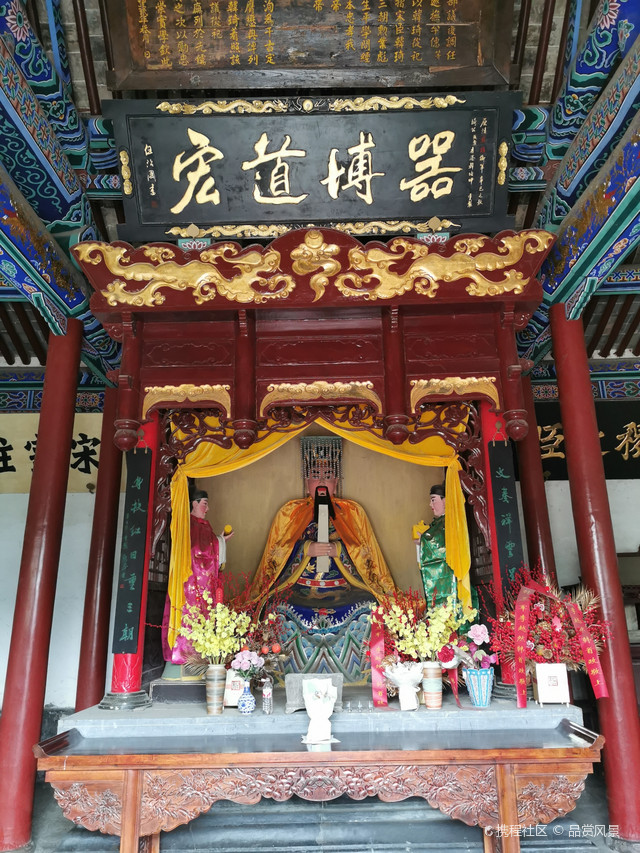
Anyang Hanwangmiaoyuzhoujintang.
Local Treats to Try
While exploring the area, don’t miss the chance to indulge in some local delicacies. Be sure to try:
– Henan-style Noodles: A staple in the region, known for their chewy texture and rich flavors.
– Braised Chicken (道口烧鸡): Famous for its tender meat and savory sauce, this dish is a must-try for any visitor.
– Sweet and Spicy Peanuts (五香豆沫): A delightful snack to enjoy as you stroll through the vibrant streets.
The combination of rich historical experiences at Anyang Hanwangmiaoyuzhoujintang, paired with the delicious local cuisine and comfortable accommodations, promises a memorable visit to this remarkable destination.
Frequently Asked Questions
-
What are the opening hours for Anyang Hanwangmiaoyuzhoujintang?
The site is open daily from 8:00 AM to 5:30 PM in summer and 8:00 AM to 5:00 PM in winter. -
How much does it cost to enter Anyang Hanwangmiaoyuzhoujintang?
Admission tickets are priced at approximately 20 yuan (about $3) per person. -
How do I get to Anyang Hanwangmiaoyuzhoujintang using public transportation?
You can take bus routes 8 or 17 and get off at the Dadongmen station, from which it is a short walk to the site. -
Is there parking available at the site?
Yes, there is parking available, but spaces may be limited, so it’s advisable to arrive early if you are driving. -
What notable features can I expect to see at Anyang Hanwangmiaoyuzhoujintang?
Visitors can explore significant historical architecture, including the main hall with its unique wooden beam structure from the Yuan dynasty, and the Zhourong Hall, which houses the “Three Uniquities Stele,” a notable work of literature and calligraphy. -
Are there any guided tours available?
While there are no formal guided tours, information panels are available throughout the site. You may also find local guides who can offer insights into the history and significance of the site. -
What is the best time to visit Anyang Hanwangmiaoyuzhoujintang?
The best time is during spring and autumn when the weather is mild, making it more enjoyable to explore the gardens and surrounding areas. -
Are there other attractions nearby worth visiting?
Yes, nearby attractions include the Yinxu Archaeological Site, Wenfeng Tower, and the Anyang Museum, all of which showcase the rich history and culture of the region.
Final Thoughts on Your Trip
Visiting Anyang Hanwangmiaoyuzhoujintang is not merely a journey through impressive architecture and historical artifacts; it’s an invitation to connect with the rich tapestry of Chinese culture and history. As you wander through the serene grounds of the Han Wang Temple and the elegant halls of the Zhou Jin Hall, you will find echoes of the past that resonate with the wisdom and values of ancient scholars and leaders. The carefully preserved structures offer a glimpse into the life of Han Qi, a revered figure whose legacy continues to inspire generations.
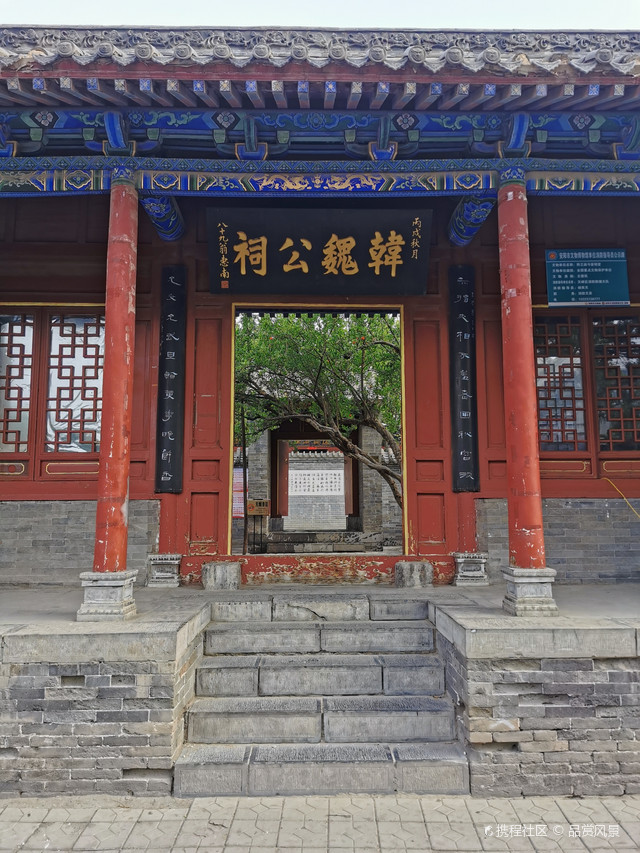
Anyang Hanwangmiaoyuzhoujintang.
Whether you are a history enthusiast, a lover of architectural beauty, or simply seeking a peaceful retreat from the hustle of modern life, this historic site in Anyang provides a unique opportunity for reflection and appreciation. Don’t forget to take a moment under the ancient trees or by the tranquil gardens, allowing the stories of the past to enrich your experience. In a world that often rushes forward, the timeless allure of Anyang reminds us to cherish our heritage and the lessons it imparts. Embrace the journey, and let the spirit of this extraordinary place leave an indelible mark on your travels.
